The Postpartum Recovery Process of the Body's Organs: How to Promote Healing

Recovering after childbirth is a significant concern for new mothers. Giving birth is physically demanding and impacts various organs in the body. Understanding how each organ gradually recovers and knowing the right methods to support this process can help new mothers maintain health and vitality. In this article, we’ll explore the natural recovery processes of different organs postpartum, as well as actionable tips for enhancing the body’s recovery.
The Postpartum Recovery Process of the Body's Organs
1. Uterine Recovery
After childbirth, the uterus begins to contract back to its pre-pregnancy size in a process known as "involution," which generally takes 6-8 weeks. During this period, the uterus also expels lochia, a combination of blood, mucus, and placental tissue that helps clear the body of residual pregnancy material.
2. Pelvic Floor Muscle Recovery
Pregnancy and childbirth can put a lot of strain on the pelvic floor muscles, leading to weakening and stretching. These muscles support the bladder, uterus, and rectum, making them vital for overall health. Without proper strengthening exercises, weakened pelvic floor muscles can lead to issues like urinary leakage or even pelvic organ prolapse.
3. Hormone Level Recovery
After childbirth, hormone levels—especially estrogen and progesterone—drop rapidly, which can lead to mood swings, fatigue, and physical discomfort. For breastfeeding mothers, the production of breast milk inhibits menstruation, delaying the return of regular hormone levels. As breastfeeding decreases or stops, hormone levels gradually return to their normal balance.
4. Weight Recovery
Most women gain between 20-30 pounds during pregnancy. Some of this weight is naturally shed after childbirth due to the loss of the baby’s weight, amniotic fluid, and placenta. However, further weight recovery relies on a balanced diet, exercise, and adjustments to lifestyle.
How to Promote Postpartum Recovery
1. Sufficient Rest
Rest is essential for postpartum healing, as it allows the body to repair and rebuild itself. New mothers should prioritize sleep and avoid strenuous activities. Family members can help relieve some of the daily tasks and stresses, allowing the new mother to recover without overexertion.
2. Balanced Diet
A nutritious diet is fundamental to postpartum recovery. Incorporate a variety of proteins, fibers, vitamins, and minerals, and avoid processed foods and those high in sugars or fats. Foods rich in iron, calcium, vitamin D, and Omega-3 fatty acids can provide vital nutrients and help replenish the body’s strength.
3. Moderate Exercise
Moderate physical activity supports strength, circulation, and metabolism. Postpartum mothers should start with light activities like walking or gentle postpartum yoga exercises to strengthen the pelvic floor and core muscles. Regular exercise can also reduce postpartum depression and improve mood.
4. Maintain a Positive Outlook
Emotional well-being plays a crucial role in postpartum recovery. Activities like meditation, breathing exercises, or engaging in hobbies can help reduce stress and balance hormones. Staying connected with friends or family members can also alleviate feelings of isolation and provide emotional support.
5. Seek Professional Help
Postpartum recovery can be complex, and sometimes professional guidance is necessary. New mothers should feel comfortable reaching out to healthcare providers or postpartum specialists for advice on issues such as pelvic floor recovery, spinal health, and emotional wellness. Specialized recovery programs may also offer tailored support for specific needs.

TruHerbs Viva Cap - Supporting Postpartum Healing and Recovery
To aid in the hormonal balance and overall health of new mothers, TruHerbs Viva Cap is a highly beneficial supplement option. Designed specifically for women, TruHerbs Viva Cap combines natural herbal ingredients to help regulate hormone levels and alleviate symptoms related to hormonal imbalance. It’s particularly suitable for use during postpartum recovery, menopause, and menstrual irregularities, helping women to stabilize their hormones, enhance their well-being, and maintain vitality during key life stages.
Product Highlights:
Hormone Regulation: TruHerbs Viva Cap features a blend of natural herbs that gently regulate hormone levels and relieve discomfort caused by hormonal fluctuations.
Energy and Immunity Boost: The formula helps support immune function and boosts physical stamina, enabling faster recovery postpartum.
Comprehensive Support: Ideal for women in various life stages, including postpartum recovery, menopause, and during menstrual irregularities.
Visible Long-Term Benefits: Regular use of TruHerbs Viva Cap can enhance skin health, strengthen the immune system, and provide a general improvement in quality of life.
To learn more, visit: TruHerbs Viva Cap Product Details
Frequently Asked Questions About Postpartum Recovery
1. How can I support uterine contraction after childbirth?
The uterus usually contracts back to its pre-pregnancy size within 6-8 weeks. Breastfeeding stimulates oxytocin production, which promotes uterine contractions and aids in quicker recovery.
2. How can I strengthen my pelvic floor muscles postpartum?
Pelvic floor exercises, like Kegel exercises, are excellent for restoring strength to the pelvic floor muscles. These exercises involve contracting and relaxing the muscles that support the bladder and uterus, helping to prevent issues like urinary incontinence and organ prolapse. Start with a few sets daily and gradually increase the number and duration.
3. How can I lose weight safely after childbirth?
Weight loss after childbirth should be gradual and focused on a healthy diet combined with moderate exercise. Breastfeeding can also contribute to calorie burning, helping with weight reduction.
4. How can I prevent and relieve back pain postpartum?
Maintaining good posture when holding or feeding the baby can prevent back strain. Gentle core-strengthening exercises can also help alleviate back pain. If needed, consulting a physical therapist can provide targeted exercises for back and core strength.
5. How can I manage postpartum mood swings?
Postpartum mood swings are typically a result of hormonal shifts. Maintaining open communication with loved ones, ensuring adequate rest, and practicing relaxation techniques can help regulate emotions. For severe mood fluctuations, consider seeking guidance from a healthcare provider.
Conclusion
Postpartum recovery is a journey requiring care, patience, and the right support. Through sufficient rest, nutrition, exercise, emotional balance, and the support of natural supplements like TruHerbs Viva Cap, new mothers can achieve faster, more balanced recovery. The postpartum period presents unique physical and emotional challenges, but by adopting a well-rounded recovery plan and choosing quality health products, new mothers can regain their health and vitality. Prioritizing a healthy lifestyle and receiving adequate support are key steps to a successful postpartum recovery.

 Bahasa melayu
Bahasa melayu 中文
中文

























